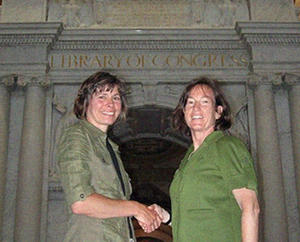- From: Carol Minton Morris <clt6@cornell.edu>
- Date: Tue, 29 Jul 2008 10:30:02 -0400
- To: semantic-web@w3.org
- Message-Id: <p06230915c4b4d9e68280@[128.84.103.27]>
July 29, 2008 FOR IMMEDIATE RELEASE Contact: Sandy Payette, Executive Director Fedora Commons, 607 255-2773, spayette@fedora-commons.org Michele Kimpton, Executive Director DSpace Foundation, 617 253-7746, michele@dspace.org DSpace Foundation and Fedora Commons Form Working Collaboration Sandy Payette and Michele Kimpton on the steps of the Library of Congress in Washington, D.C. where a Joint Information Systems Committee's (JISC) Common Repository Interface Group (CRIG) "RepoCamp" was held on July 25, 2008. Photograph by David Flanders. Washington, D.C.-July 29, 2008 Today two of the largest providers of open source software for managing and providing access to digital content, the DSpace Foundation and Fedora Commons, announced plans to combine strengths to work on joint initiatives that will more closely align their organizations' goals and better serve both open source repository communities in the coming months. This advance comes as institutions such as universities, libraries, museums and research laboratories worldwide are focused on utilizing open source software solutions for the dissemination and preservation of scholarly, scientific, and cultural heritage digital content into the future. Making books, articles, films, music, large and small data sets, scholarly works, multi-media, learning objects and mash-ups from all parts of the globe discoverable and accessible is at the core of the DSpace and Fedora collaboration. The collaboration is expected to benefit over 500 organizations from around the world who are currently using either DSpace (examples include MIT, Rice University, Texas Digital Library and University of Toronto) or Fedora (examples include the National Library of France, New York Public Library, Encyclopedia of Chicago and eSciDoc) open source software to create repositories for a wide variety of purposes. Coalition for Networked Information (CNI) director Clifford Lynch remarked, "Repositories are a key part of the infrastructure for supporting scholarly work, and they need to integrate more effectively with a range of other evolving components. I think there are great opportunities for DSpace and Fedora to work together not only on repository interoperability but on common approaches to repository roles in the scholarly and scientific workflows." The decision to collaborate came out of meetings held this spring where members of DSpace and Fedora Commons communities discussed multiple dimensions of cooperation and collaboration between the two organizations. Ideas included leveraging the power and reach of open source knowledge communities by using the same services and standards in the future. The organizations will also explore opportunities to provide new capabilities for accessing and preserving digital content, developing common web services, and enabling interoperability across repositories. In the spirit of advancing open source software, Fedora Commons and DSpace will look at ways to leverage and incubate ideas, community and culture to: 1. Provide the best technology and services to open source repository framework communities. 2. Evaluate and synchronize, where possible, both organizations' technology roadmaps to enable convergence and interoperability of key architectural components. 3. Demonstrate how the DSpace and Fedora open source repository frameworks offer a unique value proposition compared to proprietary solutions. The announcement came on the heels of an event sponsored by the Joint Information Systems Committee's (JISC) Common Repository Interface Group (CRIG) held at the Library of Congress. The event, known as "RepoCamp," was a forum where developers gathered to discuss innovative approaches to improving interoperability and web-orientation for digital repositories. Sandy Payette, Executive Director of Fedora Commons, and Michele Kimpton, Executive Director of the DSpace Foundation, reiterated their commitment to collaboration and encouraged input and participation from both communities as work gets underway. About the DSpace Foundation The DSpace Foundation (http://dspace.org/) was formed in 2007 to support to the growing global community of institutions using DSpace open source software to manage scholarly works in a digital archive. DSpace was jointly developed in 2002 by HP and the MIT Libraries. Today, there are over more than 350 organizations worldwide a using the software to capture, preserve and share their artifacts, documents, collections and research data. To learn more about the DSpace community of users see: http://www.dspace.org/index.php?option=com_content&task=view&id=596&Itemid=182 About Fedora Commons In 2007 Fedora Commons (http://fedora-commons.org/) was established as the permanent home of Fedora open source software which is a robust, integrated, repository platform that enables storage, access and management of virtually any kind of digital content. Fedora has been downloaded 25,000 times in the last year, and is used by over 125 national libraries, institutions, and businesses worldwide to do more with their digital collections, enable long-term preservation of digital assets, build on a flexible and extensible, modular architecture, keep control of their data, and participate in Fedora's innovative community. To find out about Fedora organizations, institutions and projects see: http://fedora.info/wiki/index.php/Fedora_Commons_Community_Registry.
Attachments
- image/jpeg attachment: sandy_michele.loc.jpg

Received on Tuesday, 29 July 2008 14:30:42 UTC